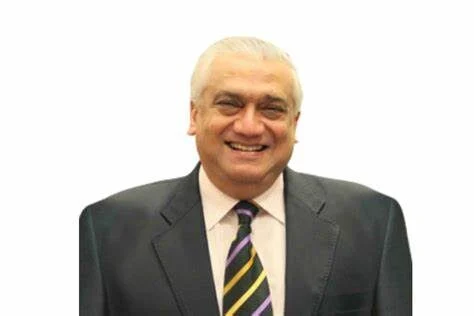In a candid interview, Talmiz Ahmad,a seasoned diplomat andformer Indian Ambassador to Saudi Arabia, Oman, and the UAE, has offered a scathing analysis of President Donald Trump’s recent visit to the Gulf countries and its implications for the Middle East, particularly the long-suffering Palestinian population and hunger. Speaking on a range of subjects, including the US-Israel relationship, American foreign policy shifts, and speculative reports on Palestinian relocation to Libya, Ahmad’s message was clear: what is being staged as diplomacy is little more than political theatrics.
Ahmad addressed reports that President Trump has ended communication with Israeli Prime Minister Benjamin Netanyahu over alleged manipulation and betrayal of the Gaza ceasefire agreement. While acknowledging growing tensions, he cautions against reading too much into these reports. “There is no concrete evidence that communication has completely broken down,” Ahmad said. He pointed out that Trump has yet to publicly criticise Netanyahu or the Israeli government’s continued genocide of Gazans, suggesting that the U.S. president was avoiding controversy during his Gulf tour to preserve the optics of diplomatic success.
The blockade of humanitarian aid and the resulting famine in Gaza, even acknowledged by some Israeli sources, has not prompted any decisive response from Washington. Instead, Ahmad observed a clear disinterest by Trump in addressing these issues publicly, which he interprets as “sulking” rather than serious policy action. Despite widespread media coverage suggesting a reorientation in American foreign policy under Trump, including rumours of U.S. recognition of a Palestinian state or plans to relocate Palestinians to Libya, Ahmad dismisses most of these reports as speculative or outright false.
“The idea of relocating one million Palestinians to Libya is not only bizarre but unworkable,” Ahmad said, emphasising Libya’s own prolonged civil conflict and lack of stability. “No Palestinian would want to go, and no Libyan would accept such an influx.”
He categorically labelled the relocation story as “fake news” and said it reflected a disturbing trivialisation of Palestinians’ suffering. Instead of relocation, Ahmad calls for an end to the blockade, resumption of humanitarian aid, and serious diplomatic engagement.
Ahmad interprets Trump’s Gulf visit primarily as a domestic political exercise designed to showcase him as a “deal-maker” to his American base. Lavish ceremonies and exaggerated financial agreements with Gulf nations were more about creating headlines than enacting policy, he argued. “Trillions of dollars in deals? That kind of money doesn’t even exist in the Gulf. These figures are inflated for the spectacle,” he remarked.
He accused Gulf leaders of pandering to Trump’s theatrical persona, offering pomp and promises to maintain their strategic ties with Washington. In exchange, they received rhetorical support and potential military guarantees though, according to Ahmad, little of actual policy substance emerged from the visit.
Ahmad expressed profound dismay at the near-total omission of the Gaza crisis during Trump’s Gulf tour. While the media projected billion-dollar deals and strategic alliances, the daily killing of dozens of Palestinians and the looming famine in Gaza remained conspicuously absent from official discussions.
“The contrast between the opulence of Gulf palaces and starving Palestinian children is gut-wrenching,” he stated. “Yet not a single mention during the entire visit.” He emphasised that meaningful discussions about Gaza, the two-state solution, or normalisation with Israel were entirely missing from public records of Trump’s engagements, which he sees as an intentional avoidance of a politically inconvenient crisis.
Turning to Syria, Ahmad offered a startling perspective. He claimed that Ahmad al-Sharaa, who was once considered a key jihadi figure with a $20 million bounty on him, has been co-opted by U.S. intelligence allegedly as part of a regime-change strategy supported by Türkiye and tacitly by Israel. “This man, a former ally of al-Qaeda and ISIS, now meets world leaders and is poised to announce normalisation with Israel. It’s shocking and deeply troubling,” he said.
If Syria normalises relations with Israel under U.S. orchestration, it would mark a symbolic victory for Netanyahu and represent a deep betrayal of the Palestinian cause, Ahmad warned.
Ahmad repeatedly dismissed suggestions that Trump is rewriting U.S. foreign policy. According to him, the U.S. president lacks the depth, vision, or strategic intent required for such a task. “This is a man of spectacle. He thrives on theatrics, not strategy,” Ahmad said.
“His foreign policy is centred on self-promotion, not serious diplomacy.” Trump’s handling of the India-Pakistan conflict was also brought up as an example of exaggerated posturing without real impact, underscoring his lack of credibility in mediating serious global issues.
Ahmad concluded with a sobering assessment: unless the United States confronts Netanyahu publicly and demands an end to genocide and blockade in Gaza, no real progress is possible.
“Netanyahu survives politically because of the war. Ending it would mean investigations, court appearances, and the collapse of his far-right coalition,” he explained.
“The people of Gaza are paying the price for his political survival.” According to Ahmad, serious American leadership would demand accountability from Israel, cease its military support, and enforce humanitarian commitments. So far, none of these steps has been taken.
On the extreme hunger in Gaza, he said, “Just when the president was leaving Abu Dhabi, a journalist pointed out to him that there is hunger in Gaza. And the man said, yes, I have heard about it. I will do something about it and rapidly got into his aircraft and disappeared. This doesn’t give me any encouragement to believe that something important and serious is being considered in Washington.”
Talmiz Ahmad’s insights paint a bleak picture of American engagement in the Middle East under Trump. The region, gripped by violence and humanitarian crises, is being sidelined in favour of showmanship, exaggerated financial deals, and opaque geopolitical manoeuvres. If peace is to have any future in the Middle East, particularly for Palestinians, Ahmad asserts that the U.S. must move beyond optics and engage with courage, clarity, and conscience. Until then, the theatre will go on and the suffering will continue.


